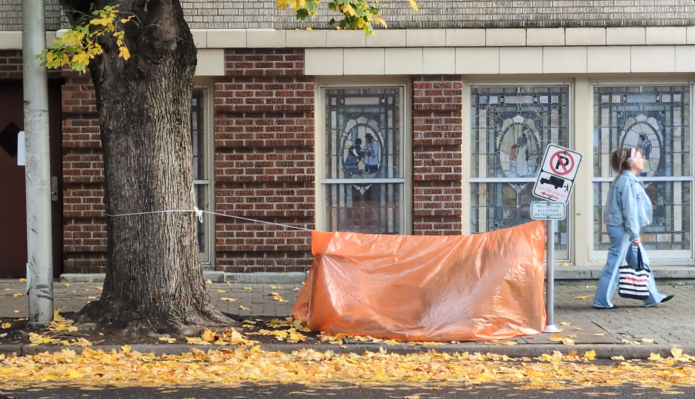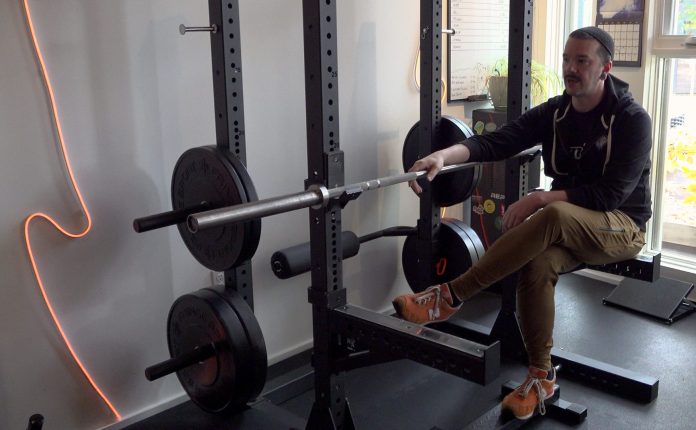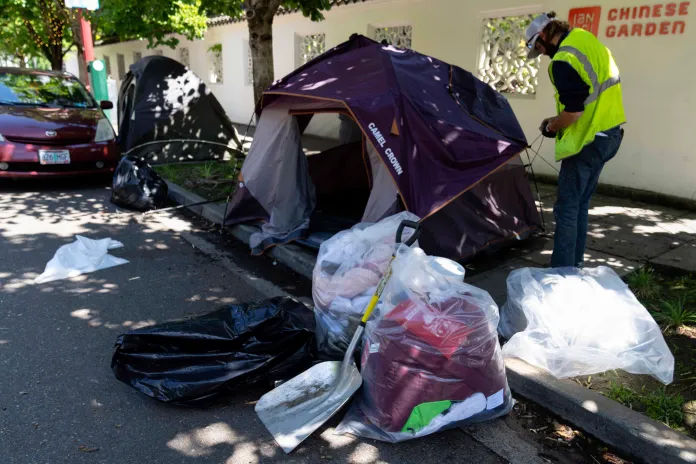PORTLAND, Oregon — At 7 a.m., going for a run in Shemanski Park, through a mile-long stretch inside Portland State University known for its Saturday Farmer’s Market, there is a mix of students walking across campus and those sleeping on benches just beginning to wake up. A group of four men, bundled up in gray blankets or coats with hoods over their heads, is already sharing a handle of brown liquor near a public restroom.
A typical brisk, cloudy Portland day as temperatures flirt with 50, the sidewalks are covered in an ombre of autumn leaves and litter from the bench dweller’s dinner the night before. With Portland Mayor Keith Wilson’s camping ban being enforced, there are no tents, but some makeshift shelters can be seen with tarps and a string between two poles.

Just a mile down the street, Elizabeth, a mother walking her two small children in Couch Park, is glad the city is doing sweeps to clean out homeless encampments.
“I feel like that’s necessary, especially around schools and parks.” Elizabeth, who had just moved to Portland from Los Angeles, said. “I remember years ago when I came to visit Portland, I went to a bank, and then in the parking lot, I came out, there was nothing but needles.”
“I always try to emphasize that as Friends of Couch Park, we can hold complex thoughts in our head,” Kara Shane Colley, the president of Friends of Couch Park, said. “Sometimes there are homeless people who are sitting here and they’re not doing a single thing wrong, and that’s perfectly fine to sit in the park. I’ve sat in parks. What is not OK is doing fentanyl in a park.”
Parents, small business owners, and local community members started Friends of Couch Park in 2023 in reaction to a man with a machete threatening people in the park. The Washington Examiner spoke with leaders in Friends of Couch Park about their efforts to improve the park by working with the city, organizing community events, and advocating stricter enforcement of laws against camping and drug use, especially since the park is adjacent to the Metropolitan Learning Center, a local school.
“We want the park to be safe,” Colley said. “There’s a million things you can do in a park. You can paint, you can read, you can sing, you can play in the playground. But I don’t have a lot of compassion when people set up a tent right next to this park, because there is no camping allowed in the city, and there, especially, should not be camping allowed next to a school.”

Max Steele is a local small business owner and the treasurer of Friends of Couch Park. He has lived in Portland for 20 years, and says since joining the group the work they have done has been good for business.
“I train people of all ages, but I also train kids.” Steele, the owner of Kanabo Fitness, said. “One of the reasons I joined this group initially was it’s a tall ask to tell parents, like, ‘Hey, have your teenager walk past the scary ‘Machete Park’ and come train,’ but that’s not something I want to ever do. I want to say, ‘I’m just past that really awesome park that you go to all the time.’”
Colley has two children in Portland Public Schools and says keeping homeless encampments away from schools is one of her main goals. She believes the group’s efforts have made a difference.
“I specifically look at tents near schools,” Colley said. “That is concerning to me, and I would definitely say there are fewer tents now than a couple of years ago.”
“Everything in Portland has an asterisk,” Steele said. “While yes, we’re making more rational decisions than before. We still have a long way to go.”
A mile down the road, staff at the Japanese American Museum of Oregon said some of the Japanese American elders in the community are hesitant to visit the museum due to the increase in crime and rampant homelessness in the Old Town area. The museum doesn’t take the concern lightly. The front door is locked at all times, and you have to call to get buzzed in from the front desk to enter.
A couple visiting from San Francisco said they specifically changed how they walked to the museum because they wanted to avoid homeless encampments in the city parks.
The parking lot across the street from the museum mentioned in the Portland City Council meeting was tent-free. The complaint was that illegally set up tents were taking up parking spots, leading to fewer people coming to the area. For these businesses, the mayor’s sweeps are working.
Just two blocks away, the Lan Su Chinese Garden also has its gate locked at all times, and visitors have to be buzzed in by an employee working the ticket counter. Photos from June 2024 show the sidewalk in front of the garden entrance lined with tents. When the Washington Examiner arrived, there was not a tent in sight.

PORTLAND RESIDENTS WANT HOMELESS ENCAMPMENT SWEEPS TO CONTINUE
A few blocks west is Urban Alchemy, located on 6th Avenue and Glisan Street. The organization offers an outdoor sanctuary where people can shower, eat, charge their phones, and wash their clothes. Outside the shelter, there is also an increase in people screaming at each other and open drug use. Allan Classen, who has lived in Portland since the ’80s, says that while these resources are needed, they create unfortunate consequences for businesses and those living in close proximity.
“It creates its own cultural atmosphere,” Classen, the editor and publisher of the Northwest Examiner, said. “Serious criminal activity goes on. From the drugs, prostitution, if you create a chaos zone, it’s very hard for it to be policed. There can be no positive social pressure because normal citizens won’t go near it.”

